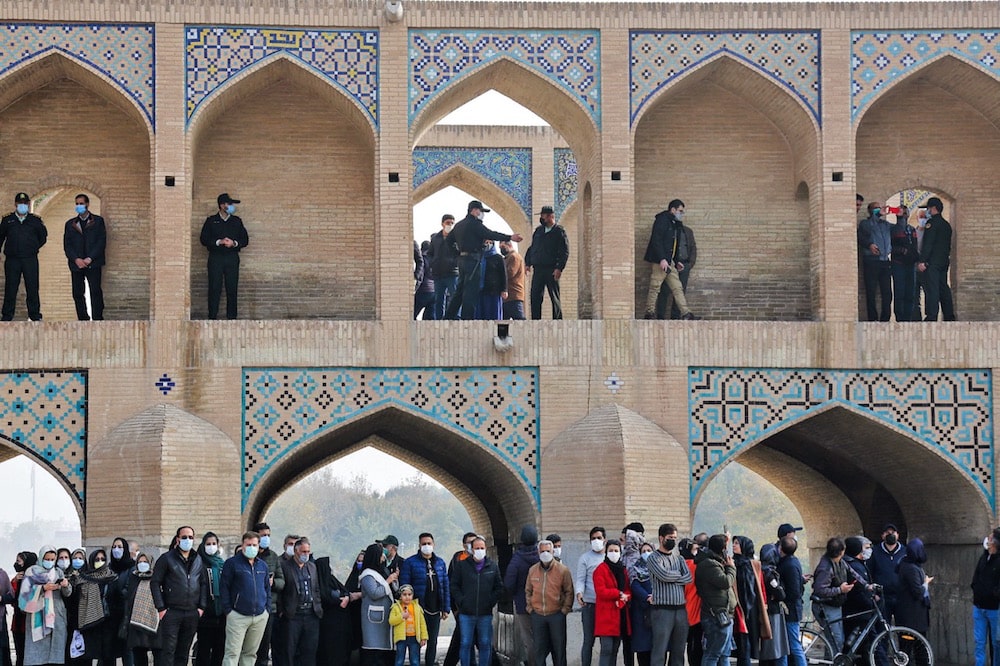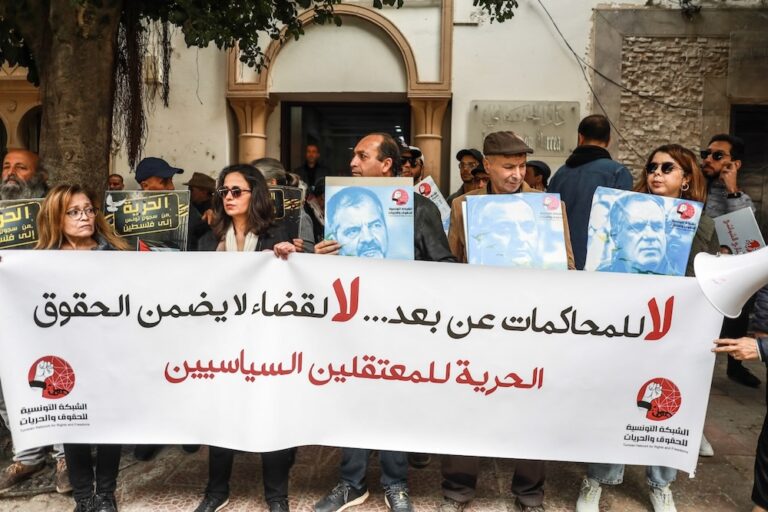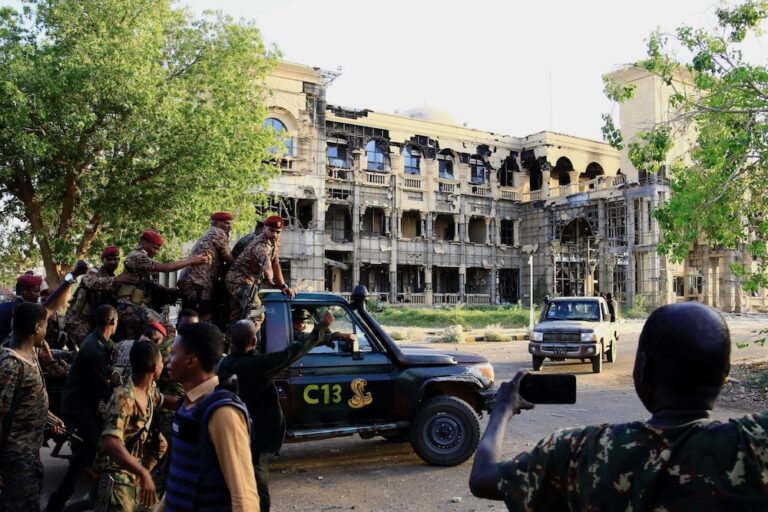November 2021 in Middle East and North Africa: A free expression roundup produced by IFEX's Regional Editor Naseem Tarawnah, based on IFEX member reports and news from the region.
The grossly unjust trials of Egypt’s detained prisoners of conscience. Water protests in Iran met with violent clampdown. Israeli spyware targets Palestinian activists. Bahrain’s decade of cosmetic reforms and escalated repression.
Egypt: Sham trials and repressive counter-terrorism laws
In an October testimony before the US Congress, Cairo Institute for Human Rights Studies (CIHRS) director Bahey eldin Hassan called attention to how Egypt’s new counter terrorism laws and courts have become political weapons wielded by the Sisi government to undermine free expression, assembly and association in the country. Speaking from personal experience, the prominent human rights defender pointed to his own sentencing in absentia to fifteen-years imprisonment by a terrorism court in 2020 on charges of “spreading false news” and “insulting the judiciary” – the longest sentence handed down against a civil society human rights defender in Egypt.
“What were my activities on which these charges were based? Speaking out publicly against human rights violations that are taking place every day in Sisi’s Egypt, where tens of thousands of political prisoners are held in harsh conditions after grossly unfair trials, or without any trial through the abuse of pre-trial detention procedures.”
In November, IFEX members the Arabic Network for Human Rights Information (ANHRI), the Association for Freedom of Thought and Expression, and the CIHRS joined rights groups in Egypt in calling for the immediate release of Alaa Abd El Fattah, Mohammed al-Baqer, and Mohammed ‘Oxygen’ Ibrahim. Having already exceeded the two-year limit of their pretrial detentions, the three prisoners of conscience await sentencing on charges of spreading false news in a security court rights groups say failed to practice even minimum fair trial standards.
After more than two years in pretrial detention, the Emergency State Security Court sentenced former parliamentarian Zyad Elelaimy to five years in prison, and handed down four-year prison sentences against journalists Hisham Fouad and Hossam Mounesin in what rights groups said “reflects the Egyptian authorities’ determination to continue lashing out at political opponents and suppressing free political participation and freedom of expression.”
Iran: Clampdown on water protests, Narges Mohammadi arrested again
Thousands of peaceful demonstrators took to the streets of Isfahan in central Iran to protest the government’s inability to address a water shortage in the region and demand a revival of the Zayandeh Rud River – a major source of water for hundreds of thousands of farmers in the province.
Two weeks of protests were ultimately met with a violent crackdown by security forces who raided the drained riverbed where protesters had been camped out, arresting at least 67 people. Internet network disruptions were also carried out in an effort to stifle the flow of videos on social media showing demonstrators being attacked.
Iranian authorities also arrested journalist and human rights defender Narges Mohammadi on 16 November while she was attending a memorial service for one of the victims of Iran’s 2019 protests. Previously arrested in 2015 and given a ten-year sentence for “establishing an illegal group,” “assembly and collusion to act against national security,” and “propaganda against the state,” Mohammadi was only recently released in October 2020 after her sentence was reduced.
“I’m in security section 2A of Evin prison [a section controlled by the Revolutionary Guards] and they’ve told me I must serve 30 months in prison and receive 80 lashes,” Mohammadi reportedly told her husband, Taghi Rahmani, during a brief phone call on the day of her recent arrest. “But as long as I live, I won’t let myself be flogged,” she continued, before the call was cut off.
Earlier this year, judicial authorities moved to bring new charges against the outspoken journalist, giving her a 30-month prison sentence, 80 lashes, and a fine for “anti-government propaganda by means of the publication of false information” and “insulting government officials,” in what Mohammadi said is a move intended to punish her for filing a complaint against Evin Prison Director Gholamresa Ziaei.
Palestine: Digital spies and offline attacks
Devices of six Palestinian activists who work for civil rights groups, recently given “terrorist organizatons” designations by Israel, were discovered to have been hacked by NSO Group’s Pegasus spyware. The activists were reportedly targeted by the Israeli-based surveillance technology prior to the designation, which received wide condemnation from the human rights community. Rights groups called the attack “part of a broader assault on Palestinian civil society” and said it raised serious questions about how Israeli authorities are using homegrown surveillance technology to target critics.
“Can you imagine how you would feel if you knew that your every movement and telephone conversation was being monitored by unknown people, that your safety was compromised and that you had no privacy?,” said Ghassan Halaika, a Jerusalem-based researcher with Al Haq, whose phone was one of those targeted. “It felt like I was living in the twilight zone.”
Meanwhile, marking the International Day to End Impunity for Crimes against Journalists, a new report by the Palestinian Center for Development and Media Freedoms (MADA) highlighted Israel’s responsibility for 91% of direct physical attacks on journalists over the past five and a half years. According to the report, such attacks are designed to keep reporters from doing their journalistic work, and “reflects a policy that aims in various ways to obscure the practices, policies and attacks carried out by the occupation in Palestine.”
In Brief
Bahrain: Imprisoned human rights defender Dr. Abduljalil Alsingace’s hunger strike has exceeded 150 days as of this writing. Protesting his mistreatment in Jau Prison and the confiscation of his book by prison authorities, the rights community has continued to draw attention to the prominent activist’s deteriorating health. He is among several prisoners of conscience who have begun hunger strikes to protest their prison conditions and harassment, including GCHR co-founder Abdulhadi Al-Khawaja, who was recently informed by prison authorities that he would no longer be allowed to receive phone calls.
Marking the tenth anniversary of the adopted Bahrain Independent Commission of Inquiry (BICI) recommendations, a new report by IFEX member Bahrain Center for Human Rights (BCHR) found that only one out of 26 recommendations has been implemented over the past decade. “Ten years on, the pro-democracy movement leaders are still behind bars, the major opposition political parties are outlawed, and the only independent newspaper in the country is indefinitely suspended,” said the report.
Libya: As the country gears up for a presidential election, a recently adopted cybercrime law threatens the work of activists and journalists. Rights groups say the law would severely restrict freedom of expression, curtail press freedom, legalize mass surveillance of speech online, and allow for the warrantless blocking of websites and content. “In order to ensure these elections are free, fair, and transparent, it is imperative to guarantee freedom of opinion and expression, as well as freedom of press, both offline and online,” said 31 rights organizations in a statement calling on authorities to immediately repeal the law.
UAE: The election of Major General Ahmed Nasser Al-Raisi as the new head of Interpol has drawn criticism from the human rights community who point to Al-Raisi’s alleged role in overseeing violations against detained human rights defenders and prisoners of conscience, including Ahmed Mansoor.
“Someone like Major General Al-Raisi, who oversaw and participated in the torture of innocent citizens, should not head an international law enforcement agency,” said Gulf Centre for Human Rights Executive Director Khalid Ibrahim.
Yemen: Journalist Rasha Abdullah al-Harazi was tragically killed in a car bombing in Aden last month that also saw her husband and fellow journalist Mahmoud al-Atmi injured in the attack. The couple were on their way to a hospital where the pregnant al-Harazi was expected to deliver her baby. While rights groups denounced the killing and called for an investigation to hold the perpetrators accountable, Yemen’s Journalists Syndicate expressed its fear that the killing is a “dangerous indicator of a new and violent phase targeting journalists in Yemen” in the context of the country’s widespread impunity and lack of accountability for the killers of journalists.
Also Noteworthy
In Lebanon, IFEX member Social Media Exchange (SMEX) convened its fourth Bread&Net regional discourse, bringing together hundreds of online participants from around the world to discuss the state of digital rights and freedoms in the Arabic-speaking region. Discussions ranged from the documentation of digital rights abuses, and re-envisioning the Santa Clara Principles, to topics on funding feminist AI technology, regional internet shutdowns, and cyberviolence against women journalists and the LGBTQI+ community.
In a year that saw targeted censorship of pro-Palestinian content online, and the Pegasus leak reveal how spyware has been increasingly used to target activists and journalists in the region, some of the most critical conversations centred on holding social media companies accountable for their content moderation policies, and halting the sale and use of surveillance technologies.



